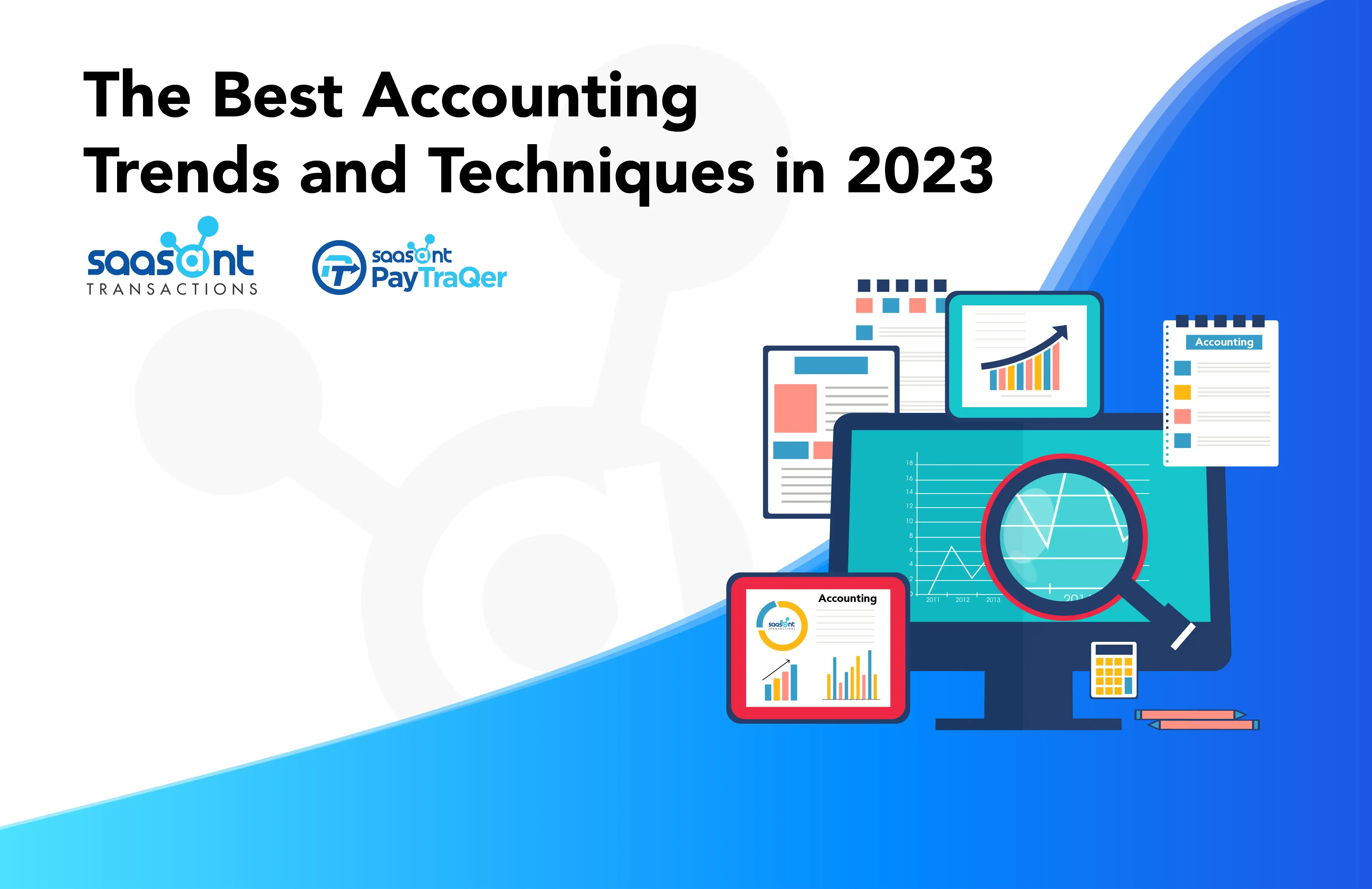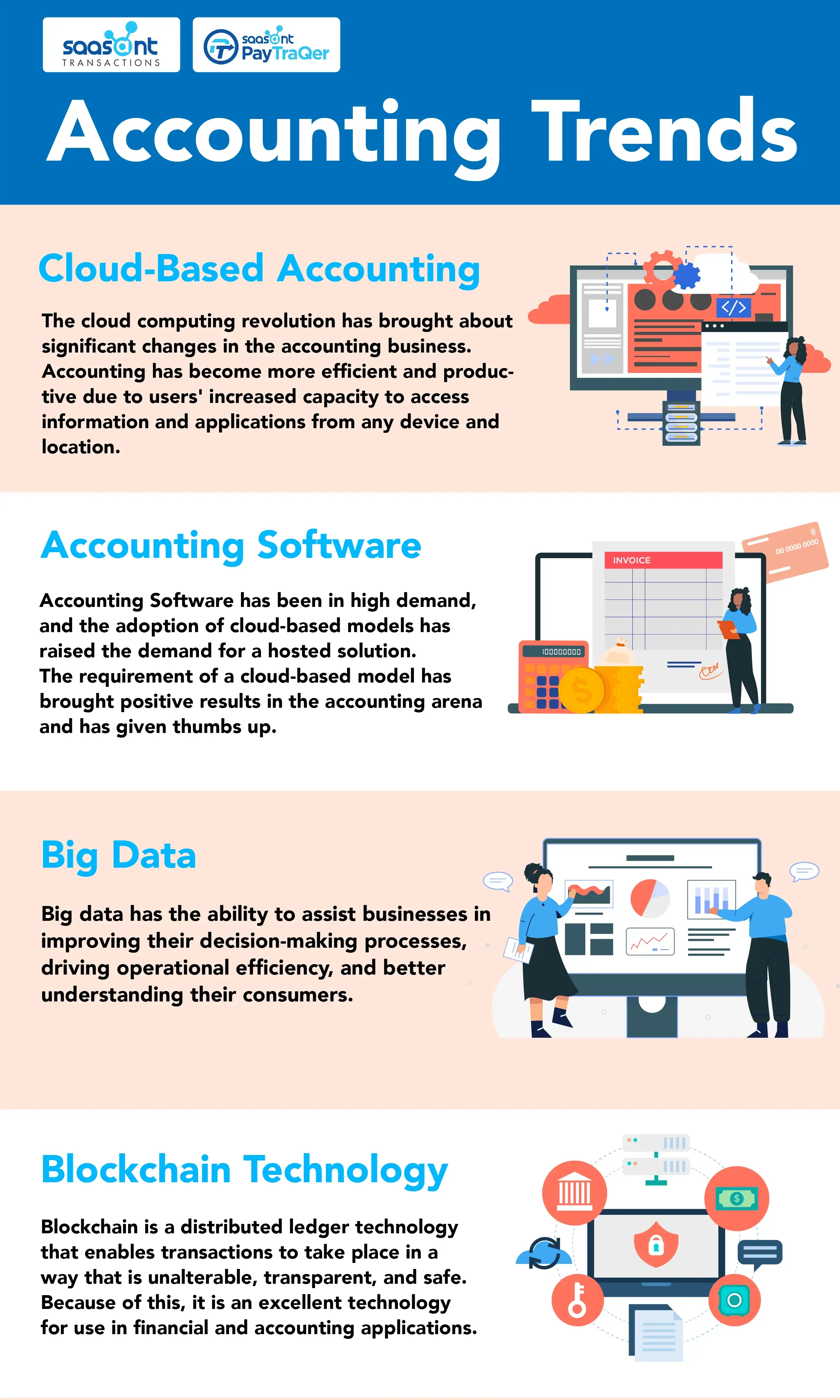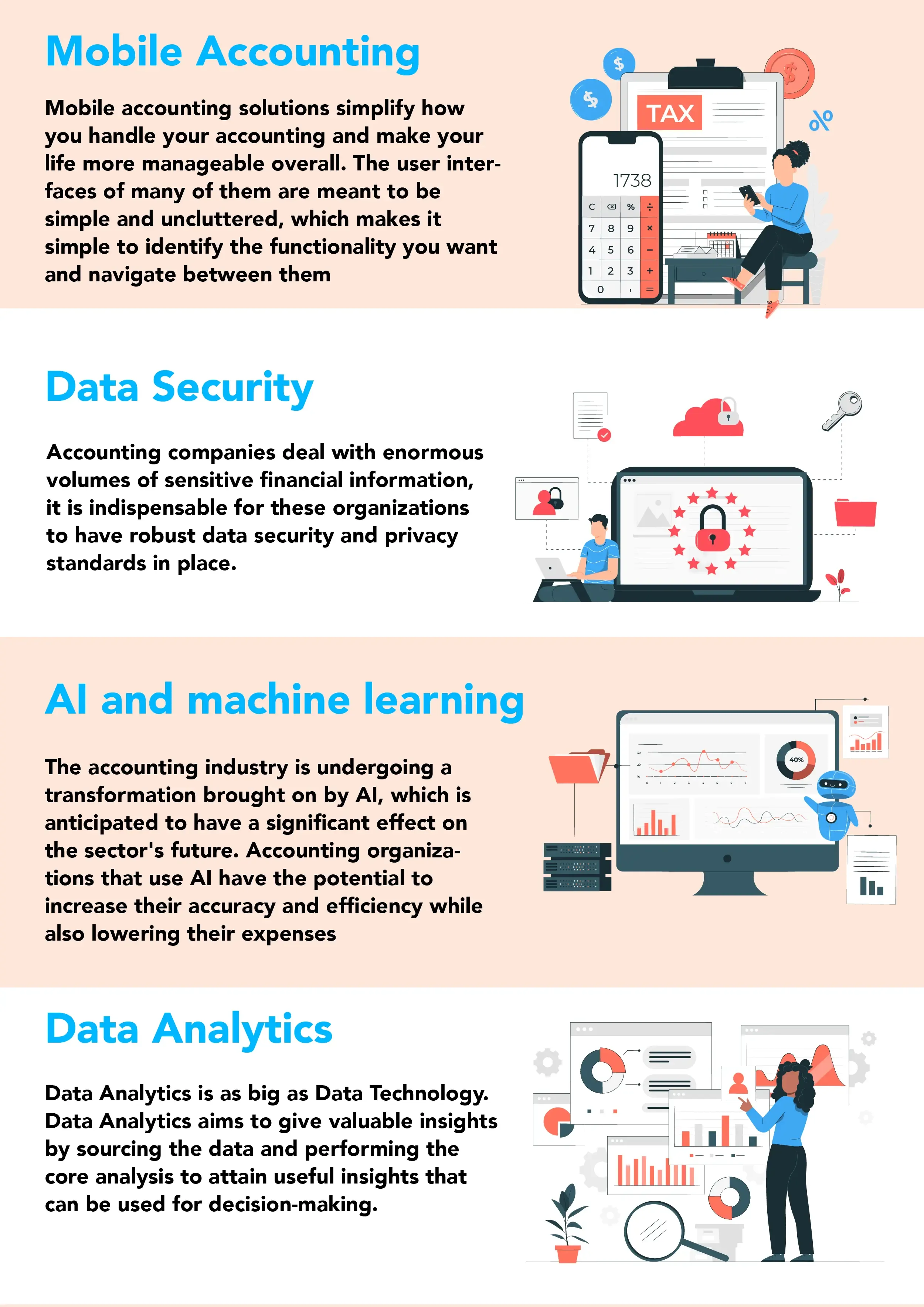A Detailed Guide on Best Accounting Trends and Techniques in 2023

Accounting is an ever-evolving field. However, the accounting fundamentals remain the same, and new technology developments, such as automation, big data, cloud, etc., change how businesses handle their finances.
A decade ago, desktop accounting software was prevalent. You can now access it over the cloud or using a mobile application. Professionals had to sit for hours and enter data manually. These days automation helps eliminate mundane manual entry.
So, accounting trends and techniques kept changing throughout the accounting evaluation cycle. However, businesses that adapt to new accounting trends always thrive by saving time and resources. Keep reading to know more about accounting trends and techniques in 2023 that will save you a lot of time with minimal effort to grow your business.
Contents
Accounting Trends in 2023
Accounting Software
Big Data
Blockchain Technology
Mobile Accounting
Data Analytics
AI and machine learning
Data Security
Conclusion
Accounting Trends in 2023
Cloud-Based Accounting
The cloud computing revolution has brought about significant changes in the accounting business. Accounting has become more efficient and productive due to users' increased capacity to access information and applications from any device and location.
MWR (Market Wide Report ) predicted cloud accounting software growth rate would be a compound annual growth rate ( CAGR ) of 7.8%, and the market will expand to a whopping US $5,653.5 M market by 2029.
It means market growth will bring developments that will change the game of accounting to what we know it as now. So, businesses that adapt to the cloud early will benefit the most as it lays the foundation of the required cloud infrastructure.
Top accounting techniques that have arisen in the era of cloud computing and changed the accounting workflow.
Access to data in real-time: The cloud has enabled businesses to gain access to data in real time. This enables companies to make choices based on the most recent and accurate information at their disposal.
Collaborating with Your Accountant or Bookkeeper: The cloud has made it simpler for companies to work with their accountants and bookkeepers. Businesses can collaborate more efficiently to get things done by sharing documents and information stored in the cloud.
Automation: In addition, the cloud has made it possible to automate many accounting processes. This indicates that firms might save time by automating operations that need them to do repetitive actions, such as billing, reporting, and data entry.
Scalability: Because the cloud may be readily expanded or contracted, businesses are able to easily adjust their accounting procedures to meet their changing needs, thanks to the cloud's scalability. This is an excellent solution for companies that go through phases of rapid expansion or seasonal shifts in revenue.
Potential for significant cost reductions: Another potential advantage of adopting the cloud for accounting is the potential for significant cost reductions. Businesses can reduce their overall spending on information technology by avoiding the expense of purchasing on-premises hardware and software.
For an accountant looking after organizational transactions, keeping accurate data and entering it into bookkeeping software like QuickBooks or Xero would be daunting. A minor human error would lead to difficulties during the financial reconciliation. The accountant professional can mitigate such errors using cloud-based automation software like PayTraQer or SaasAnt Transactions. They automatically sync the transactions into QuickBooks & Xero, thus nullifying any human error.
Accounting Software
As Mordor intelligence states, the accounting software market expects a growth rate of 8.5% within the next five years. So, it will be ideal for small business owners leaning toward accounting software. Accounting Software has been in high demand, and the adoption of cloud-based models has raised the demand for a hosted solution.
The requirement for cloud-based accounting softwares has brought positive results in the accounting arena and has given thumbs up.
User-Friendly functionality that is easy to understand and adapt.
The high technology is embedded with various functions.
Robust Methodology to support accounting with proper technologies.
Some software has adopted this and is showing great results. QuickBooks and Xero are the prominent ones in this field.

Big Data
Big data refers to exceptionally massive data collections, which can be structured, unstructured, or semi-structured. There are a few different ways that these data sets can be organized. Big data may be broken down into three categories: volume, velocity, and variety. Big data has the ability to assist businesses in improving their decision-making processes, driving operational efficiency, and better understanding their consumers.
Even if the application of big data in accounting is still in its infant stages, there are already a number of possible applications that might be developed using this technology. For instance, large amounts of data may be used to detect fraud, make financial projections, and locate accounting inconsistencies. It is expected that the use of big data in accounting will become more common as the number of data being created continues to expand. This is due to the fact that big data can store enormous amounts of data.
Blockchain Technology
Blockchain technology has efficiently improved the scope of accounting. The term "blockchain" is becoming more familiar to the general public as a result of the emergence of Bitcoin and other cryptocurrencies.
However, what exactly is blockchain? In a nutshell, blockchain is a distributed ledger technology that enables transactions to take place in a way that is unalterable, transparent, and safe. Because of this, it is an excellent technology for use in financial and accounting applications.
For instance, blockchain technology might be utilized to record transactions, authenticate identities, and track ownership of assets.
It has streamlined various other accounting aspects, such as:
Reconciliation.
Maintaining Ledger and Distributed Ledger technology.
Smart Contracts.
Easily verified financial accounts.
This technology has much potential and expertise to replace traditional accounting methods. Blockchain technology will help reduce paper trails and immensely improve accounting and auditing areas. It also improves the accounting workflows and efficiently contributes to bookkeeping.
Mobile Accounting
It is no longer sufficient for accounting software to be hosted in the cloud and compatible with mobile devices; instead, it must be created from the ground up to be used only on smartphones. Users are able to keep track of their money while they are on the go, thanks to mobile accounting applications, which are seeing a surge in popularity as a rising number of individuals conduct business on their smartphones and tablets.
The fact that mobile accounting applications are typically quite simple to operate is one of the nicest things about them. The user interfaces of many of them are meant to be simple and uncluttered, which makes it simple to identify the functionality you want and navigate between them. The fact that they were developed expressly for mobile devices also means that they are typically considerably easier to use than standard accounting software designed for desktop computers.
One further advantage of mobile accounting applications is that they frequently come packaged with various tools that help simplify and expedite various aspects of your work. For instance, some applications allow you to take pictures of receipts and save them digitally, eliminating the need for you to worry about misplacing paper records.
Others enable you to make invoices or keep track of your mileage for tax purposes while you are on the move. In addition, several mobile accounting applications include security protections comparable to those used by banks to safeguard your data.
Consider using a mobile app if you're seeking a solution to simplify how you handle your accounting and make your life more manageable overall. Because there is such a wide variety of excellent choices available, you should spend some time investigating the many alternatives to identify the one most suited to meet your requirements.
Data Analytics
Data Analytics is as big as Data Technology. Data Analytics aims to give valuable insights by sourcing the data and performing the core analysis to attain useful insights that can be used for decision-making.
One needs to understand the importance of Data Analytics, and it works on the following aspects:
Identification of Customer Spending.
The Market Behaviour.
Anticipating various future Trends along with rules and regulations.
Thus, technologies provide a clearer and better view of the company's financial structure by providing valuable information.

AI and machine learning
The accounting industry is undergoing a transformation brought on by AI, which is anticipated to affect the sector's future significantly.
Bookkeeping, the preparation of tax returns, and auditing are only some applications of artificial intelligence (AI). Accounting organizations that use AI have the potential to increase their accuracy and efficiency while also lowering their expenses. In addition, artificial intelligence can deliver insights that people may not be able to recognize on their own.
For instance, machine learning may be utilized to do data set analyses in order to spot patterns and linkages within the data that may point to fraudulent activity or other types of financial irregularities. With the assistance of AI, this kind of analysis could be completed.
Globally, ranging from traditional banking to fintech startups. AI is extensively deployed to prevent fraud, quantify and assess risks, extend customer care solutions with applications such as AI chatbots, create propensity models for intelligent targeting, and analyze economic trends and data. AI and machine learning will amalgamate technology, finance, and economics, thereby creating a solid data center for the entire industry as a unit to enable them to chart out growth strategies.
Data Security
Data security and privacy are essential concerns for every company, but accounting companies must place emphasis on them precisely due to the nature of their work. Because accounting companies deal with enormous volumes of sensitive financial information, it is indispensable for these organizations to have robust data security and privacy standards in place. When it comes to protecting client information and maintaining their privacy, accounting companies should pay attention to the following crucial areas:
Encryption of data: It is recommended that all sensitive data be encrypted while in transit and stored. In the event that there is a security breach at the company, this will contribute to the protection of the data.
Strict restrictions on data access: only authorized workers should be able to view sensitive information. There have to be stringent restrictions so that only those with a legitimate need to access the data can do so.
Ongoing surveillance: The company needs to maintain ongoing surveillance of its systems for potentially malicious behavior. This will assist in determining whether or not any possible dangers or breaches exist.
Trustworthy partners: Any third-party suppliers with access to the company's data should be well-screened and trustworthy partners with stringent security measures.
Conclusion
The field of accounting is one that is always developing, both in terms of its practices and its prevalent tendencies. It is essential to have a solid understanding of the upcoming accounting best practices in order to maintain a competitive edge in the years to come. Accounting processes, such as automation, integration of blockchain technology, and data analysis tools, which may assist firms in remaining one step ahead of their rivals, will continue to evolve with technology as it moves forward. You can ensure that your company will continue to be at the forefront of innovations within its sector if you remain current with the greatest accounting trends and techniques.